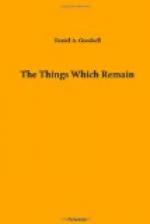But we are very far from seeing that final agreement among the critics which warrants us in discarding a single book. If any one has been fought about, and fought over, it is the Gospel of John. “It used to be said that this was not a history at all, but an idealizing of tradition in the interest of a speculative idea;[1] now theologians are mostly agreed that if John is the most speculative, he is, at the same time, the most personal of New Testament writers.” No other book has been finally overthrown. Archaeology has confirmed Paul, and also some Old Testament writers, especially those who speak of widely separated settlements of the Hittites. I get a strong impression that the New Testament writers are sometimes attacked because they teach what the critics do not wish to believe. Thus it would appear that Harnack scouts the early chapters of Matthew and Luke because he doubts the virgin birth, and would hold that belief therein is no part in authority or value of the Christian religion.
[Footnote 1: Denney. Studies in Theology.]
[Sidenote: Bible Appeal for Verification.]
[Sidenote: Gracious Ability.]
[Sidenote: Huxley’s Passionless Impersonality.]
[Sidenote: Gracious Conditions for Belief.]
[Sidenote: Ethical Conditions for Faith.]
I now wish to declare my own confidence that the verification of the truths contained in the New Testament was never intended to rest upon an absolutely inerrant record or on an inspiration which dictated to a personality rather than expressed itself through a personality. The Bible presupposes a power in man to test and verify its statements and doctrines. It makes its appeal to this steadily from the earlier books to the later; the appeal growing in content as the soul has developed its power of recognition. This is the familiar law of knowing and doing, of proving by practice, of perceiving the leadership of Jesus Christ through the leading of the Holy Ghost. As to doctrine, there is left in man the power to make the beginning of a faith. On this beginning devotion builds a belief in the greater mysteries. Thus reason deduces a First Cause, then the unity of the First Cause. This is as far as reason can go. Huxley, looking out on the universe with this power, said: “There is an impassable gulf between anthropomorphism, however refined and the passionless impersonality underlying the thin veil of phenomena. I can not see one tittle of evidence that the great unknown stands to us in the light of a Father.” Nor could he. Religious truth is conditioned in a way in which the apprehension of physical truth is not. There must be a certain condition of the heart, conscience, and will to see the truth of the Godhead of Christ. One may resist this evidence.[2] Only a living Christian is competent to look at the subject—“unto you it is given to know the mysteries of the kingdom of God.” In physics “nothing is needed but open eyes




